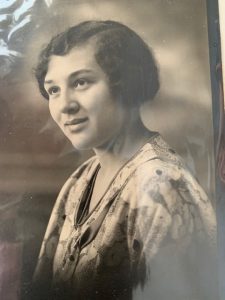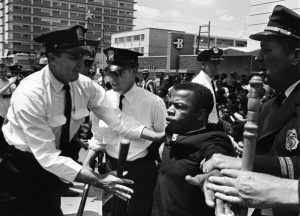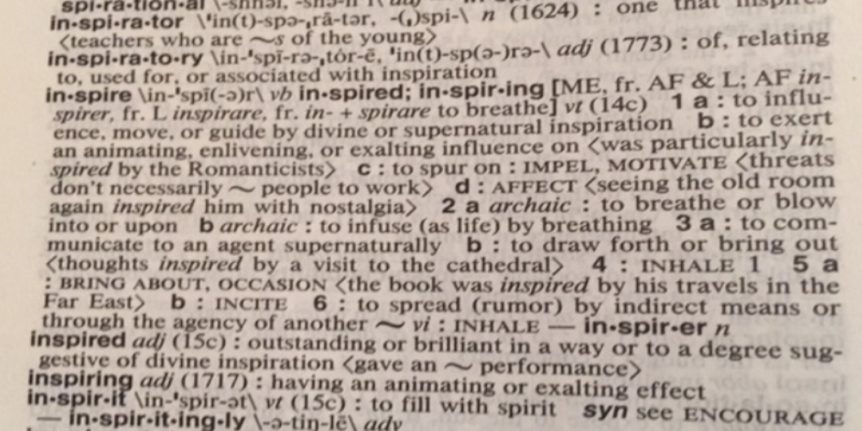I often ask Siri for the definition of a word as I struggle to expand my limited vocabulary since it’s so convenient. However, when I really want to grapple with a word I usually return to my Merriam-Webster collegiate dictionary!
Here are some of the definitions I found for inspire:
1.To influence, move, or guide by divine or supernatural inspiration
To exert an animating, enlivening, or exalting influence on
To spur on
2. To breathe or blow into or upon
To infuse (as life) by breathing
People who, by their words, their actions, and/or how they have lived out their lives, have done the above for me I call “inspirers.” I expect I have been inspired by hundreds, maybe more over my journey. Some are folks from long ago and some I just came across yesterday. They are famous persons who most everyone has heard of and others are known to very few. Some have been guides, role models and encouragers, and some have actually breathed new life into me! I believe it is God, however we see God, at work through these inspirers.
My only regret is the potential inspirers I didn’t recognize, acknowledge, or take the time to get to know. I expect at times I consciously or unconsciously wasn’t ready to hear what they had to say. I do think I’m growing some in this regard and for that I am most grateful. It is often the inspirers we find most difficult to listen to that have the greatest potential to enrich our lives and at times transform us!
I would like to share just a few of the hundreds of inspirers that have made—and continue to make—an impact on my life.

Ida Lieb
The very first I can remember was my mother. Following some inquisitive questions on the part of yours truly in Vacation Bible school, the pastor visited our home and gave me a one-sided lecture, telling me I wasn’t supposed to ever question God, his understanding of God, or his “inerrant” understanding of the sacred text!
After politely ushering the pastor out our kitchen door, my mother sat me down and said, “Terry, any God who doesn’t welcome your questions isn’t a God worth spending time with!”
Obviously at that point I had no idea how that simple yet profound statement would inspire a lifelong journey of searching out and discovering this awesome God who is constantly surprising and challenging me. I didn’t realize that it would directly inspire my selection of a woman who in return has inspired me for the past 48 years or that it would have a significant influence on my approach to treating my patients for over 45 years. And I certainly didn’t know that it would inspire me to begin writing a book on the formation of our God image! The ripple effect from that single incident is impossible to calculate.
Another inspirer I’d like to acknowledge is a man I never met personally but certainly read a lot about and saw in the media: John Lewis. Following his death Rita and I were listening to an interview Krista Tippett had done with him years before. He made a statement that has lodged in my mind and I expect will be with me for the rest of my days!

John Lewis arrested.
John Lewis said, “You have to be taught the way of peace, the way of love, the way of non-violence. In the religious sense, in the moral sense, you can say that in the bottom of every human being, there is a spark of the Divine. So you don’t have a right as a human to abuse that spark of the divine in your fellow human being.
“From time to time, in our training we would discuss that, if you have someone attacking you, beating you, spitting on you, you have to think of that person. Years ago that person was an innocent child, an innocent little baby. What happened? Did something go wrong? Did someone teach that person to hate or abuse others? You try to appeal to the goodness of every human being and you don’t give up. You never give up on anyone.”
In essence, always look for that spark of the divine in the other person. Senator Lewis even included the police who had beat him on the head with nightsticks during the civil rights struggle! What an inspiration!
Last week a person was tailgating me and began blowing his horn and shouting out of the window, words I can’t put in print. I expect he was upset because I was only driving 35 miles an hour in a 35 mph speed zone! I have worked hard at changing my longtime response to this behavior, fortunately with some success, so I was able to keep my cool.
Then this person then chose to pass me on a solid double yellow line. While passing he also raised one of his fingers on his extended right arm. It was at that precise moment when John Lewis showed up. “Look for the spark of the divine in that person!”
As I struggled to do that I realized the young man was not about to fracture my skull with a nightstick. I can’t say I was actually able to see a spark of the divine in that young man but John Lewis certainly allowed me to put that brief encounter into perspective.
Finally, I’d like to share an experience I had yesterday at Walmart, which might seem to be an unlikely place for inspiration. However, I often find my “sneaky” God showing up in places, people and experiences where I least expect it!
As I was perusing the aisles, I noticed a young woman nearby. With bright lavender hair and both arms completely covered in tattoos, she was hard not to notice! As I watched, this woman—clearly another customer, not a store employee—strode over to a senior gentleman beside me, who was looking at the shelves in some confusion.
“Can I help you find something?” the “standing out” young woman asked.
The man drew back and gave her a long once-over. I wondered what was running through his head. These days stores have become a battleground over mask wearing and even though both of these folks were wearing masks, it wasn’t hard to imagine that they would be on opposite ends of the political spectrum—and probably every other spectrum as well! How would he take her offer, as helpful or an intrusion?
Finally he said, “Yes, I need a six pack.” He hesitated. “Of chocolate Ensure for my wife!” He barked with laughter.
She chuckled behind her brightly-colored mask. “Follow me,” she said.

Photo by Joey Velasquez on Pixabay.com
I was curious to see how this would play out so I followed her as well, as inconspicuously as possible. She quickly located the Ensure and said, “My grandfather uses this stuff, too.”
The older gentleman thanked her and then continued, “I no longer have hair to color like you but I wish I did. However, I do have one of those tattoos like you which I got overseas when I was in the army.” He rolled up his sleeve and showed her his tattoo. I couldn’t see it since I was standing several feet away pretending to explore the laxative section but I did hear him say, “That’s my wife’s name. We were only dating when I joined the army but I knew from the get-go if I made it back home, she was the lady I wanted to spend the rest of my life with.”
I was inspired! Two folks breathed new life into me at the same time. Her spontaneous willingness to reach out to a stranger! His ability to find something they have in common! These two very different folks gave me hope that we will be able to somehow bridge this increasing division between us as citizens of this amazing country we call America.
I don’t remember why I went to Walmart but I left with inspiration, hope, and a challenge to strive to be more like those two strangers. They’re the most recent—but certainly not the last—addition to my ever-growing list of inspirers.
QUESTIONS FOR DEEPENING THE JOURNEY
- Who have been the inspirers in your journey? What have they done to inspire you?
- Have you told them about the impact they have had on your life? If not, why haven’t you?
- Has anyone ever told you that you had inspired them? If so how did this feedback make you feel?
- Do you think at times you don’t recognize or acknowledge potential inspirers that present themselves? How could you be more receptive to inspiration?
- Do you feel comfortable questioning God or the understanding of God that has been imparted to you by others? Why or why not? What would being more open to questioning mean for your faith journey?
- Are you able to reach out to people very different than yourself and search out what you have in common? What are some specific ways you can build bridges with dissimilar people?
- Are you as concerned as I am about the growing division within our country or are you becoming more and more comfortable just being with people who are similar to yourself?

